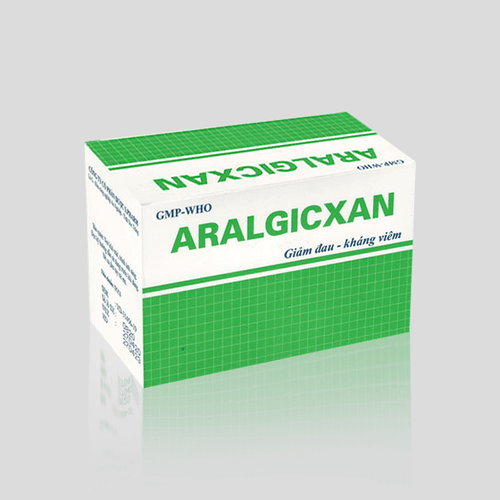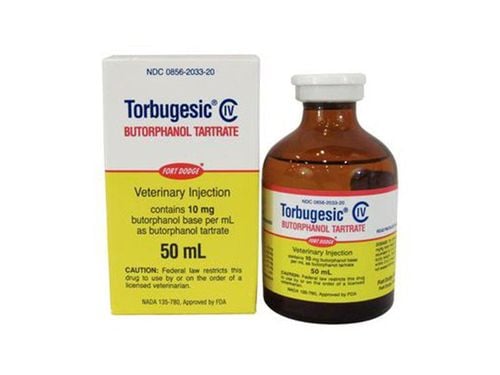This is an automatically translated article.
Dexibuprofen is an NSAID pain reliever and anti-inflammatory agent. This active ingredient is in the drug Nalgidon 400. So what is this drug, how is it indicated and what should patients pay attention to when using?
1. Uses of the drug Nalgidon 400
Nalgidon 400 is indicated for use in the following cases:
Pain relief and anti-inflammatory mild to moderate in some diseases such as dysmenorrhea, headache, toothache and dental procedures, musculoskeletal pain ; Symptomatic treatment, pain relief from rheumatoid arthritis.
2. Contraindications of Nalgidon 400
The following cases must not use the drug Nalgidon 400 :
Allergy to Dexibuprofen or any of the excipients of the drug Nalgidon 400 ; Hypersensitivity to Aspirin or to other non-steroidal anti-inflammatory drugs; Patients with advanced peptic ulcer disease, Crohn's disease or advanced ulcerative colitis; Patients with asthma or bronchospasm, coagulopathy, cardiovascular disease, history of peptic ulcer, liver or kidney failure (glomerular filtration rate less than 30ml/min); People who are being treated with the anticoagulant Coumarin; Patients with congestive heart failure, decreased circulating volume due to diuretics or renal failure (increased risk of renal dysfunction), severe liver failure; People with gum disease (at risk of aseptic meningitis). It should be noted that all patients with aseptic meningitis had a history of an autoimmune disease; Pregnant women in the last 3 months of pregnancy.
3. How to use Nalgidon 400
Adults: The usual dose in pain relief is 600 - 900mg/day, divided into 2 to 3 times orally. The maximum dose per use is 400 mg (1 tablet of Nalgidon 400 ). Dosage may be increased abruptly to 1200 mg/day (4 Nalgidon 400 tablets) in case of severe acute pain. Children: Nalgidon 400 should not be used in children under 18 years of age because safety in this age group has not been established. Elderly: The lowest effective dose of Nalgidon 400 should be used, which can then be increased gradually if well tolerated. Patients with mild and moderate hepatic and renal impairment: Start with the lowest effective dose of Nalgidon 400 and require close monitoring. Nalgidon 400 should not be used in patients with severe liver or kidney failure.
4. Note when using Nalgidon 400
Nalgidon 400 should be used with caution in patients at risk of gastrointestinal side effects due to non-steroidal anti-inflammatory drugs.
Nalgidon 400 should be used with caution in patients with heart failure, hypertension, liver or kidney disease, especially when the patient is on diuretic therapy (at risk of fluid retention or adverse effects on renal function). ). If the use of Nalgidon 400 for this group of patients is necessary, it is best to prescribe the lowest possible dose and periodically check renal function.
Caution should be exercised when administering Nalgidon 400 to the elderly because of the higher risk of undesirable effects associated with non-steroidal anti-inflammatory drugs.
Nalgidon 400 can cause dizziness, fatigue, so it should be used with caution in people doing jobs that require alertness such as driving, operating complex machinery.
Use of Nalgidon 400 in pregnant women:
Non-steroidal anti-inflammatory drugs can inhibit uterine contractions and delay labor, even cause pulmonary hypertension and severe respiratory failure in neonates due to closure of the uterus. early uterine ductus arteriosus; At the same time, NSAIDs also inhibit platelet function and increase the risk of abnormal bleeding; After taking non-steroidal anti-inflammatory drugs, pregnant women are at risk of low amniotic fluid and anuria in the newborn. Therefore, Nalgidon 400 is contraindicated for use in the third trimester of pregnancy. Using the drug Nalgidon 400 during lactation:
Dexibuprofen has the ability to pass into breast milk in very small, insignificant amounts; The risk of adverse effects in the nursing infant is low when the mother takes Nalgidon 400 at the usual dose.
5. Nalgidon 400 . side effects
Common side effects of Nalgidon 400:
Abdominal bloating, abdominal pain, nausea, vomiting, diarrhea; Fever; Tired; Headache, dizziness. Rare side effects of the drug Nalgidon 400:
Allergic reactions (especially bronchospasm in asthmatics), rhinitis, urticaria, rash, rash; Drowsiness, insomnia; Tinnitus; Gastrointestinal bleeding, progressive peptic ulcer; Constipation ; Prolong bleeding time; Peripheral edema; Stevens-Johnson syndrome; Hair loss;
6. Drug interactions of Nalgidon 400
Nalgidon 400 combination of anticoagulants may increase the risk of bleeding. If this combination is unavoidable, the patient should be closely monitored for bleeding time during treatment and if necessary, the anticoagulant dose should be adjusted accordingly; In combination with Methotrexate at doses of 15 mg/week or more: Nalgidon 400 increases the toxicity of methotrexate. Therefore, patients being treated with high doses of Methotrexate should not take Nalgidon 400; Other non-steroidal anti-inflammatory drugs, when used concurrently with Nalgidon 400, increase the risk of bleeding and ulceration of the gastrointestinal tract; Lithium: Nonsteroidal anti-inflammatory drugs such as Nalgidon 400 may increase plasma lithium concentrations by reducing renal clearance. Therefore, avoid concomitant use of Nalgidon 400 with Lithium. If the combination is mandatory, the blood lithium level should be checked periodically, and if necessary, the dose of lithium should be reduced.
Please dial HOTLINE for more information or register for an appointment HERE. Download MyVinmec app to make appointments faster and to manage your bookings easily.













